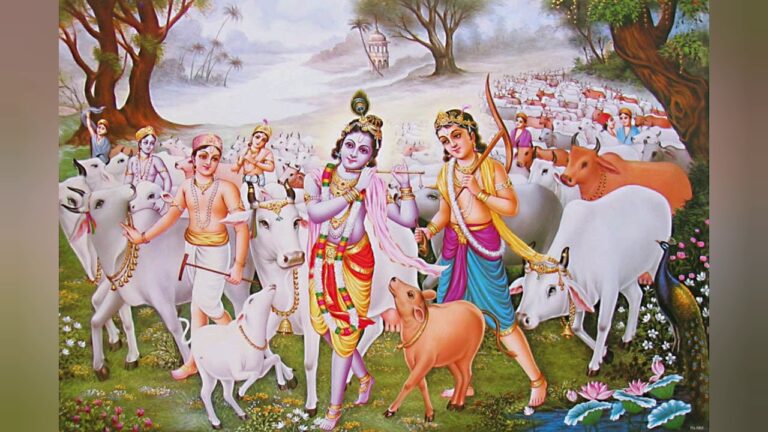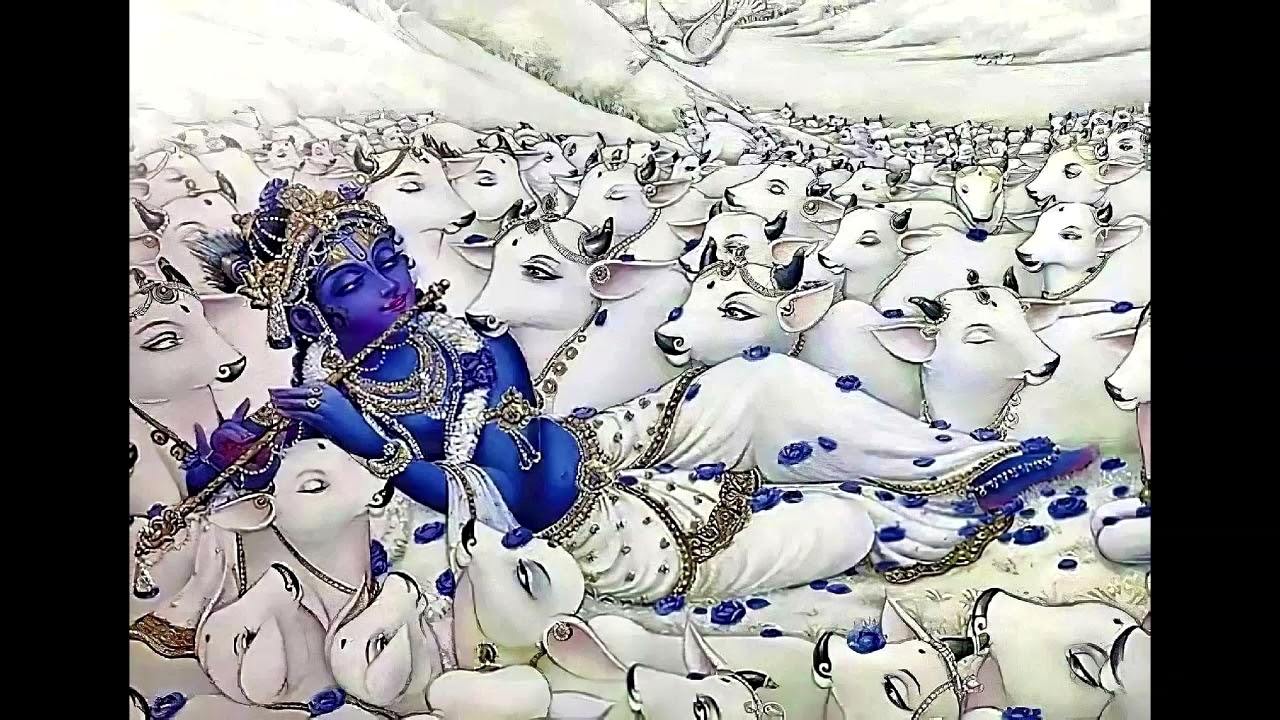Meaning
Meaning
“Gopal” is a Sanskrit word that holds deep religious significance in Hinduism.
It literally translates to **_“Cowherd”_**, referring to Lord Krishna, who is often depicted as a playful cowherd deity.
The name evokes images of Krishna’s childhood pastimes tending to cows and playing with the gopis (milkmaids).
Literal Interpretation
At its most basic level, “Gopal” refers to someone who cares for or herds cows.
This literal interpretation is rooted in the agricultural traditions of India where cows held immense cultural and economic value.
However, the name’s significance extends far beyond a simple occupational description.
Religious Significance
“Gopal” carries profound religious connotations due to its association with Lord Krishna.
Krishna, considered an avatar of Vishnu, is revered as the divine protector and nourisher.
As Gopal, he embodies qualities of compassion, love, playfulness, and spiritual guidance.
The name Gopal holds significant meaning, symbolism, and cultural relevance, deeply rooted in Hindu traditions.
Meaning:
At its core, Gopal signifies “cowherd” or “keeper of cows.”
Origin:
It originates from Sanskrit, a classical language of India, where “go” translates to “cow” and “pal” means “to protect or tend.”
Symbolism:
- Cows in Hinduism: Cows are revered as sacred animals, symbolizing abundance, nourishment, motherhood, and non-violence.
- Gopal as a protector: The name suggests a nurturing and protective nature, highlighting the importance of caregiving and responsibility.
- Connection to Krishna: Gopal is an epithet for Lord Krishna, one of the most beloved deities in Hinduism. Krishna, known for his playful nature and devotion to cows, exemplifies the virtues embodied by the name Gopal.
Cultural Significance:
Within Hindu culture, the name Gopal carries deep religious and social significance:
- Religious reverence: Parents often choose the name Gopal for their sons as a tribute to Lord Krishna and a prayer for their child’s virtuous qualities.
- Idealistic traits: The name evokes desirable characteristics such as compassion, kindness, honesty, and a strong moral compass.
- Family values: Gopal connects to the traditional Indian values of family, community, and the well-being of all creatures.
In modern times, while rooted in tradition, the name Gopal retains its charm and resonates with individuals seeking a meaningful connection to their cultural heritage.
Origin
Gopal’s name is rooted in ancient **Sanskrit**, a language that holds deep significance in Indian culture and spirituality.
The name *Gopal* itself comprises two Sanskrit words:
*Go*, meaning “cow,” and *Pal*, meaning “protector.”
Therefore, Gopal directly translates to “**cow protector**. ”
This connection to cows reflects the profound reverence for these animals in Hindu mythology and tradition. Cows are considered sacred, symbolizing motherhood, nourishment, and abundance.
In **Hindu mythology**, *Gopal* is a popular epithet of Lord Krishna, a beloved deity known for his playful nature and divine protection over his devotees.
Krishna’s association with cows further emphasizes the significance of this name within the religious context.
As an _epithet_ of Krishna, Gopal evokes themes of love, devotion, and spiritual guidance.
It embodies Krishna’s role as a shepherd who protects his herd, but also as a divine protector of humanity.
Gopal originates from Sanskrit, an ancient Indo-Aryan language.
It’s a compound name composed of two words: “Govinda” meaning “he who steals butter,” and “pala” meaning “protector.”
Therefore, Gopal translates to “stealer of butter, the protector.”
In Hinduism, Gopal is a beloved epithet for Lord Krishna, one of the principal deities in the Hindu pantheon.
Krishna’s playful nature and fondness for stealing butter from village homes are legendary.
The name Gopal thus reflects these endearing qualities.
While primarily prevalent in India, the name has gained global recognition thanks to the widespread popularity of Krishna’s story and reverence.
It’s commonly used as a first name for boys across various Indian communities, including North, Central, and South India.
Beyond India, Gopal is also found in neighboring countries such as Nepal, Bangladesh, and Sri Lanka, where Hinduism is widely practiced.
The globalization of culture has further contributed to the spread of the name, making it recognizable and increasingly popular in other parts of the world.
History
The name Gopal finds its roots in ancient Indian mythology and Sanskrit language.
Meaning:
- Gopal primarily signifies “cowherd” or “protector of cows.”
- It is derived from the Sanskrit words “go” (cow) and “pala” (guardian, protector).
Origin:
The name has its origins in Hinduism, particularly within the Vaishnavite tradition.
Ancient Mentions in Literature:
- Mahabharata: The epic Mahabharata features Gopal as a name associated with Krishna, the eighth avatar of Vishnu.
- Bhagavad Gita: In this sacred scripture, Krishna is often referred to as “Gopal” by devotees who admire his role as a shepherd and protector.
- Puranas: Various Hindu Puranas, ancient mythological texts, contain numerous references to Gopal as a name for Krishna.
Historical Significance:
The name Gopal carries significant cultural and religious importance in India. It embodies the values of compassion, protection, and devotion to cows, which are considered sacred animals in Hinduism.
Gopal is a Sanskrit name meaning “cowherd” or “one who protects cows.” It is derived from two Sanskrit words: go (“cow”) and pala (“protector”).
The name has deep roots in Hindu mythology and tradition. Gopal is most famously associated with Lord Krishna, the eighth avatar of Vishnu, who is often depicted as a cowherd tending to his beloved cows.
Throughout history, the name Gopal has been used predominantly in India and other South Asian countries where Hinduism is prevalent. Its popularity stems from its association with Lord Krishna’s benevolent nature, love for animals, and divine grace.
Over time, the name Gopal has evolved in its usage and pronunciation across different regions.
- In North India, it is often spelled as Gopāl or Gopaljee.
- In some parts of South India, variations like Gopla or Gopaal are common.
- The pronunciation also varies depending on the region and language.
While Gopal primarily remains a Hindu name, its positive connotations and association with Krishna have sometimes led to its adoption by individuals from other faiths as well.
In recent years, the name Gopal has experienced a resurgence in popularity, particularly among parents seeking traditional yet meaningful names for their children.
- 30 Best B2B Leads Database Providers to Try in 2025 - April 26, 2025
- Best Clay Alternatives for 2025 - April 26, 2025
- Best Lusha Alternatives for 2025 - April 26, 2025


